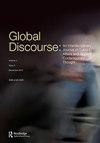对女性生殖器切割叙事脆弱性的戏剧性解读:对理查德·施韦德(Richard Shweder)《对达乌迪·博赫拉妇女的起诉》的回复
IF 1.4
Q2 INTERNATIONAL RELATIONS
引用次数: 1
摘要
受到Richard Shweder论文的启发,如何看待“女性生殖器切割”?在《为什么理解文化至关重要》(麻省理工学院出版社,2000年)一书中,我写了剧本《人类仪式》,试图挑战观众对女性割礼(俗称“女性生殖器切割”)习俗的假设。在《人类仪式》的整个发展过程中,我与施维德和富安拜·西娅·阿赫玛杜(他们两人都是剧中角色的原型)进行了研究和广泛的互动,我经历了对剧中表达的有争议观点的预期和意外的反对,以及一个白人男性创作一部关于黑人和棕色人种女性身体的戏剧的适当性。《人类仪式》的两部作品继续在观众中引发了高度参与的对话,因为他们努力解决自己对女性生殖器切割的先入为主的观念,对男性和女性割礼的道德态度的差异,以及西方人通常对其他国家和文化的“原始”做法持有的固有道德权威。Shweder随后的论文《对Dawoodi Bohra妇女的起诉:一些合理的怀疑》启发了《人类仪式》的续集,它将质疑西方犹太和基督教社区中被广泛接受的男婴割礼习俗。本文章由计算机程序翻译,如有差异,请以英文原文为准。
A dramatic interpretation of the fragilities of the FGM narrative: a reply to ‘The prosecution of Dawoodi Bohra women’ by Richard Shweder
Inspired by Richard Shweder’s paper, What about ‘Female Genital Mutilation?’ And Why Understanding Culture Matters in the First Place (MIT Press, 2000), I wrote the play Human Rites seeking to challenge audiences’ assumptions about the practice of circumcision among women, known colloquially as ‘female genital mutilation’ (FGM). Throughout the development of Human Rites, which involved research and extensive interaction with Shweder and Fuambai Sia Ahmadu (both of whom served as bases for characters in the play), I experienced anticipated and unanticipated pushback on the controversial perspectives voiced in the play, as well as the appropriateness of a Caucasian man authoring a play about black and brown women’s bodies. The two productions of Human Rites went on to generate highly engaged dialogue among audiences, as they grappled with their own, mostly unexamined pre-conceptions about FGM, the disparity in moral attitudes toward male and female circumcision, and the inherent moral authority Westerners often hold with regard to ‘primitive’ practices in other countries and cultures. Shweder’s subsequent paper ‘The prosecution of Dawoodi Bohra women: some reasonable doubts,’ has inspired a kind of sequel to Human Rites, that will interrogate the widely accepted practice of circumcision among infant boys in Western Jewish and Christian communities.
求助全文
通过发布文献求助,成功后即可免费获取论文全文。
去求助
来源期刊

Global Discourse
Social Sciences-Political Science and International Relations
CiteScore
4.10
自引率
6.70%
发文量
64
期刊介绍:
Global Discourse is an interdisciplinary, problem-oriented journal of applied contemporary thought operating at the intersection of politics, international relations, sociology and social policy. The journal’s scope is broad, encouraging interrogation of current affairs with regard to core questions of distributive justice, wellbeing, cultural diversity, autonomy, sovereignty, security and recognition. All issues are themed and aimed at addressing pressing issues as they emerge.
 求助内容:
求助内容: 应助结果提醒方式:
应助结果提醒方式:


